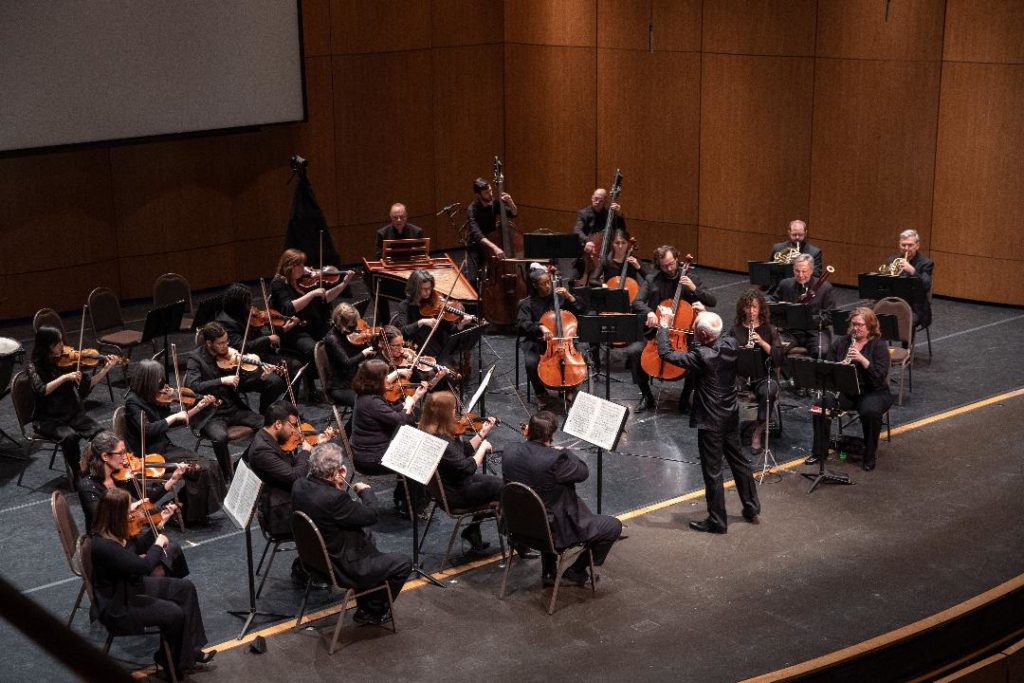
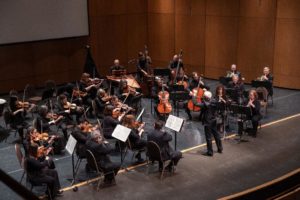 [rating=5]Maestro Nicholas Kraemer seamlessly conducted Handel, Boyce, Haydn, and Mozart in Sunday night’s performance of the Music of the Baroque at the North Shore Center for the Performing Arts. It was remarkable to see Kraemer conduct the orchestra without a score for over two hours (with a 15-minute intermission). Clearly, he had committed every single note of music to memory as well as all the cues for the solo instruments! How amazing is that!
[rating=5]Maestro Nicholas Kraemer seamlessly conducted Handel, Boyce, Haydn, and Mozart in Sunday night’s performance of the Music of the Baroque at the North Shore Center for the Performing Arts. It was remarkable to see Kraemer conduct the orchestra without a score for over two hours (with a 15-minute intermission). Clearly, he had committed every single note of music to memory as well as all the cues for the solo instruments! How amazing is that!
At the beginning of the program and between compositions, Kraemer discussed the evening’s theme of London, England, and the music that was either inspired by the city or written largely while the various composers lived there. Starting out the evening was a discussion of native Englishman William Boyce and his Symphony No. 5 in D Major, op 2. The methodical and forceful rendition of his three movements seemed to beg for an absent fourth that was never written, probably corresponding with his increasing deafness.
Next on the list was George Frideric Handel’s “Water Music” Suite No. 1 in F Major, HWV 348. This suite was written in 1715, a year after his patron Georg Ludwig, the Elector of Hanover, arrived in London to become King of England. We learned from Kraemer that this composition was “not written about the water but for performance on the water”, considering his patron’s affinity for concerts on the Thames. Although Handel did not live in London when he wrote this composition, he subsequently moved to the city in 1723 and lived in a house in Mayfair until the end of his life. Portions of “Water Music” consist of lively oboe solos by Erica Anderson and stirring bassoon solos by Lewis Kirk, followed by mellow horn duets by Jonathan Boen and Matthew Oliphant, echoed by the stringed instruments. What is most interesting is how tempo changes occur within most of the movements and how the rendition shifts from rapturous to bouncy with shifts from 4/4 to 6/8 time.
After intermission, it was on to Wolfgang Amadeus Mozart’s Symphony No. 1 in E-flat Major, K. 16. For 15 months, Mozart lived with his father Leopold and his sister Maria Anna in London while the three were on tour in Europe. As Kraemer described it: Leopold was ailing while they were in their London house, and he didn’t want to hear any noise! So… Mozart wrote a symphony when he was only eight years old! Composed in 1764, the music is complex with its “extraordinary texture, … its harmony and dissonance.” The Andante portion is notable by the predominance of the cello and bass.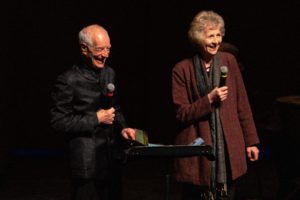
The last selection was Joseph Haydn’s Symphony No. 101 in D Major (Clock). Haydn visited London in 1790-1792 and again in 1794-1795, with his last known address being in Westminster, and this symphony was first performed in London in 1794. Kraemer told us how clocks came into vogue in the 18th century, and he believed that it was one of Haydn’s publicists who chose to emphasize this in the title. Here we hear the ticking mechanism of the clock, largely through the bassoons and the bass during the Andante movement. Mary Stolper, on flute, presented us with a series of brilliantly executed solos throughout the performance. And during the Finale: Vivace section, the woodwinds and horns created a powerful end to the evening’s concert.
Inspirational pictures and quotations from famed contemporaries provided the backdrop for the music. Flashed on a screen behind the orchestra were slides of famous paintings from the London of that time period as well as historical maps of the city. In addition, Kraemer also displayed a modern London map to explain how the four composers (on whom the program was based) all lived close to Central London and Regents’ Park—and he included music director Dame Jane Glover in their number. In contrast, Kraemer showed us on the map (using a green laser pointer, no less) how he currently lives in a northern borough of London: the joke, of course, being that he is the outlier. And considering the strength of this performance, this was no idle boast! Lots of love and sheer joy were infused into Kraemer’s conducting, and it was fun to catch a glimpse of his facial expressions that were reserved for the orchestra.
The maestro outdid himself in directing such an impressive repertoire. He emphasized the nuances within each of the compositions with keen accuracy and verve. Without a music stand (or a harpsichord) interposed between conductor and orchestra, the instrumentalists could respond to every subtlety in Kraemer’s body language. The symbiosis of conductor and orchestra was powerful, and I’ve never seen anything like this before!
“London Calling” by Music of the Baroque was performed at the North Shore Center for the Performing Arts, 9501 Skokie Boulevard, in Skokie, on Sunday, February 26, 2023. This was followed on Monday, February 27th by a performance at the Harris Theater, in Millennium Park, 205 W. Randolph Drive, in Chicago. Both concerts began at 7:30 p.m.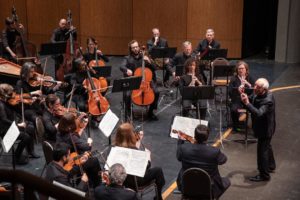
On demand performances (via the internet) are available for unlimited watching/listening beginning on Friday, March 3rd at 10:00 a.m. Visit https://www.baroque.org/Seasons/2022-2023/London to purchase an OnDemand Pass. For more information about this option, go to: https://www.baroque.org/Venues/on-demand.
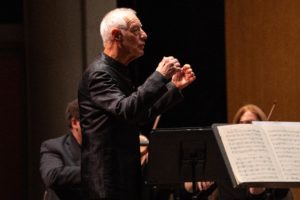 For information on this and future performances of Music of the Baroque, including times, dates, and locations, please go to: https://www.baroque.org/.
For information on this and future performances of Music of the Baroque, including times, dates, and locations, please go to: https://www.baroque.org/.
Music of the Baroque is a resident company of the North Shore Center for the Performing Arts. To learn more about the venue, their future offerings, and ticket prices, visit: https://northshorecenter.org/.
To learn more about the Harris Theater, their future offerings, and ticket prices, go to: https://www.harristheaterchicago.org/.
COVID requirements are continually changing. Presently, masks are optional and there is no need for the audience to provide proof of vaccination. For further information about COVID protocols at the various venues, visit: https://www.baroque.org/healthandsafety.



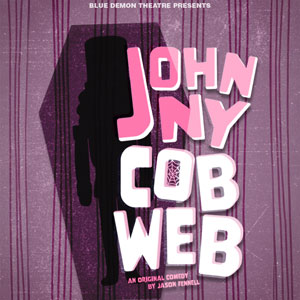

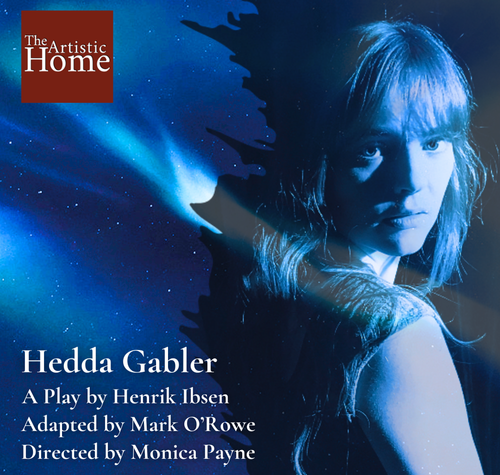
More Stories
2025 Glenbrook North Variety Show
“Cookie”
“The Puccini Heroines in concert at the Lyric